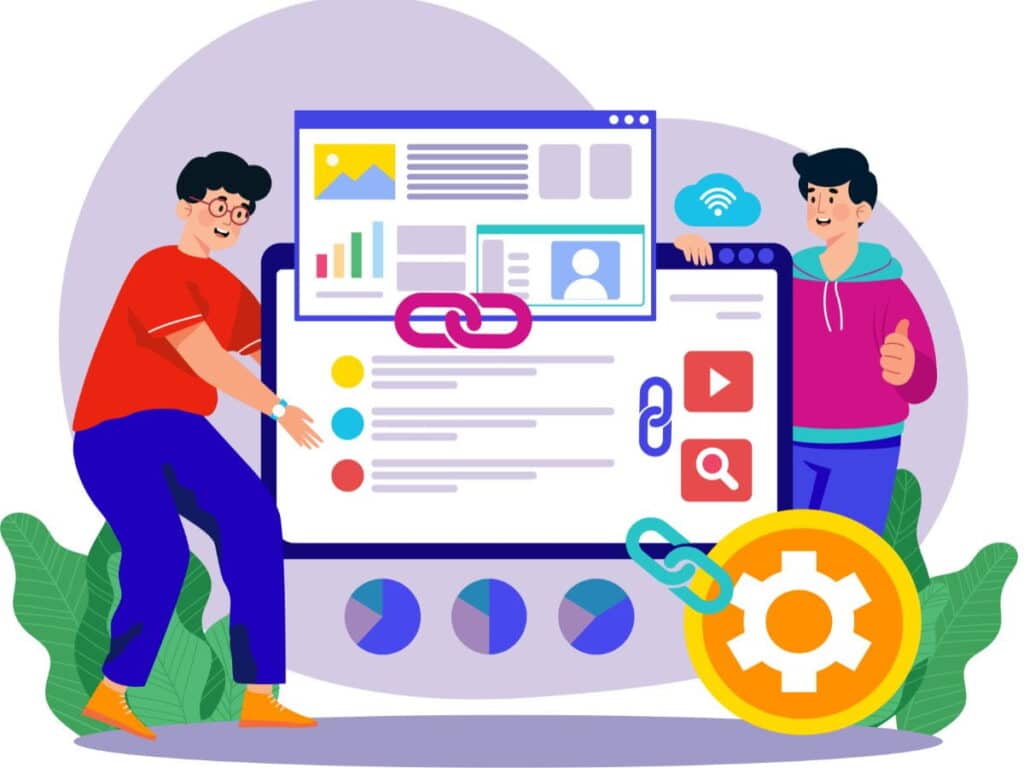Are you looking to use Bing alongside Google to drive more organic traffic to your website? That’s a smart move. Bing is the second most popular search engine, after all. It also offers a less competitive and more visually focused platform for small enterprises.
While optimizing for multiple search engines is beneficial, knowing their differences is crucial. This way, you can fully leverage each platform to your advantage. Let’s explore the unique aspects of Google SEO vs. Bing SEO and the ways to optimize your website for both search engines.

Keyword Optimization
Google and Bing’s algorithms share similar keyword ranking factors but differ in their approaches. Here’s how.
Google’s Approach to Keywords
Google SEO is semantic. It focuses on understanding search intent and contextual hints, delivering results that align with the overall meaning behind user queries. This makes exact-match keywords less important.
Bing’s Approach to Keywords
Meanwhile, Bing values traditional SEO tactics more, including exact-match keywords and (historically) metadata. In 2014, the platform announced that meta keywords no longer affect SEO but didn’t explicitly discourage their use.
Here are some actions you can take to optimize keywords correctly across both platforms.
- Mix broad- and exact-match keywords for balanced coverage.
- Update your content regularly to align with evolving SEO practices.
- Consider including meta keywords when optimizing for Bing, specifically for ad purposes.
- Focus on using keywords to create people-first content.

Backlink Strategies
Backlinks are a crucial ranking factor for both Google and Bing SEO. They evaluate a website’s authority through its backlink quantity, quality, and relevance. However, their level of importance varies.
Google’s Backlink Preferences
Backlinks are a significant aspect of Google SEO—and for historical reasons. Before becoming the most popular search engine in the world, it was a link-focused search engine called Backrub. The name was later changed to Google, inspired by “googolplex,” symbolizing the goal of organizing boundless, accessible information.
Google prioritizes websites with a strong backlink profile—high-quality, diverse, and relevant links from authoritative sites. Be careful of black hat strategies; Google has a strict stance on link buying and penalizes websites for engaging in such activities.
Bing’s Backlink Preferences
In contrast to Google, Bing doesn’t place as much emphasis on backlinks. It still does but in a different way. It values the number of external links and anchor texts more than their quality. Having a few strong recommendations from trusted platforms and clear directions within your own site helps you appear more relevant.
Bing also finds older domains and sources with .edu or .gov extensions more authoritative due to their established and trustworthy nature. Prioritizing such links helps you rank highly on the search results.
When it comes to link buying, Bing is more lenient than Google. However, we still recommend exercising caution at all times.
Here are some tips for creating a backlink strategy that works well for the two search engines.
- Always prioritize quality over quantity when building relationships with credible sites.
- Strive for high-quality, relevant backlinks. Avoid spammy links (usually from low-quality and irrelevant sources) to protect your reputation.
- Collaborate with reputable industry websites and earn natural links.
- Venture into guest posting for respected blogs or websites in your niche.
- Most importantly, craft content that others would also want to link to.

Social Signals
Do you keep track of user engagement on your brand’s social channels? You should. The average person uses social media for 143 minutes per day. Considering how people dedicate a large part of their day to these platforms, social media offers an enormous marketing opportunity for businesses.
But do search engines perceive social signals the same way? Let’s find out.
Google’s View on Social Signals
Unfortunately, Google doesn’t factor social signals into its ranking algorithms. However, social engagement can still indirectly influence SEO. It boosts visibility and generates more backlinks, enhancing your SEO efforts.
Bing’s View on Social Signals
Bing openly acknowledges social signals as a major ranking factor. Pages with more social likes, shares, and comments rank higher on the search results. A robust social media marketing strategy is essential to win on this platform.
Check out these strategies for leveraging social media to improve SEO on Bing while indirectly boosting your presence on Google.
- Engage with your social media audience regularly to establish a loyal following.
- Craft shareable content and encourage your followers to share them.
- Stay visible and relevant by posting regularly.
- Optimize your social media channels. Add relevant keywords to your profiles.
- Display social proof across all your platforms to establish a trust signal.
- Work with relevant influencers to amplify your reach.
Multimedia Content and Visual Search
A study found that people do 323% better at following directions when they have both text and illustrations than just text alone. This is one of the many reasons more than half of marketers today prioritize visual marketing strategies. Let’s compare Google SEO vs. Bing SEO in this aspect.
Google’s Prioritization of Text-Based Content
Despite multimedia advancements like Google Lens, Google’s SERPs remain minimalist. It prioritizes high-quality, text-based content for strong SEO rankings. Moreover, users can use images for searching but can only paste image URLs or upload them from their computers. Clear and helpful text continues to determine a web page’s relevance and authority.
Bing’s Emphasis on Multimedia Content
On the other hand, Bing strongly emphasizes a visual search experience. Its SERPs display information in an infographic style. To see the difference, let’s compare a search for “how to fix a faulty faucet” on both search engines.

Bing also has an image search feature like Google but may generate more high-quality images and detailed information. To rank high on its SERPs, optimize your pages with rich and engaging multimedia content that matches the user query.
Regardless of the differences, it’s clear that visual efforts can still impact your overall SEO performance. Apply the following optimization tips when working on multimedia content for both search engines.
- Compress files to improve load times without compromising quality.
- Add clear, relevant, and descriptive alt texts to your images. This will help search engines better understand your content.
- Create video transcripts, subtitles, and captions to improve accessibility and boost engagement.
- Use descriptive metadata and relevant keywords when optimizing file names, tagging, and indexing. This enhances your discoverability in the searches.
- Generate image sitemaps to help search engines understand and index them correctly.
Technical SEO Differences
Technical SEO allows your website to operate smoothly. It ensures your web pages are crawled and indexed, load fast, have working links, provide relevant content, and are optimized for mobile use. Technical SEO is a ranking factor for both Google and Bing, but they work and prioritize things differently.
Here are the technical differences between Google and Bing SEO.
Google’s Technical SEO Focus
Google prioritizes regular crawling, site speed, mobile responsiveness, structured data, and XML sitemaps. These factors allow both users and search engines to understand your content better. You can find, modify, and update these factors using tools like Google Search Console.

Here’s an overview of technical SEO elements that Google considers when ranking websites.
- Regular Crawling: Frequently checks every page on your website to ensure Google delivers the latest information to its users
- Site Speed and Mobile Responsiveness: Enhance user experience
- Structured Data: Displays a clear, richer, and standardized way for search engines to understand and interpret the information on your page
- XML Sitemaps: Provide a roadmap for search engines to discover and index your pages more accurately and efficiently
Overall, these technical aspects maintain a clean, crawlable site structure so Google can easily navigate and grasp your site and improve search rankings.
Bing’s Technical SEO Focus
In terms of technical SEO, Bing operates differently from Google. It crawls web pages less frequently and focuses less on site performance and user experience. Nevertheless, this doesn’t diminish the essence of technical SEO, so proactively monitoring your site’s performance is crucial.
Fortunately, Bing offers several tools to enhance crawl rates and streamline URL submission. For instance, Webmaster Tools and URL Submission API provide features where you can
- submit sitemaps or bulk URL submissions,
- monitor crawl activity,
- include a path to the sitemap in your robots.txt file,
- improve indexing efficiency, and
- address website issues.
Google doesn’t have these features, which give you more control over managing crawls and large-scale URL updates. Be sure to check out these tools when optimizing for Bing, as the search engine perceives them as ranking signals.
To navigate the technical differences between Google and Bing and achieve high rankings on both platforms, do the following:
- Regularly check your website’s crawling and indexing status.
- Structure your site with a clear hierarchy and keep your XML sitemap updated.
- Ensure a smooth user experience by optimizing for mobile.
Takeaway
Google SEO vs. Bing SEO: Which one is better? Both offer unique advantages that can propel your brand to greater heights. But why choose one when you can optimize for both?
Google and Bing prefer the same qualities on a website: clean, well-structured, and relevant. They only prioritize different factors and offer various tools when ranking content. Adapt accordingly and create a diverse SEO strategy to achieve broad search engine visibility and long-term success in the evolving digital landscape.
Need a helping hand? Marketing Done Right is one call away. Stay informed on the latest SEO trends for Google and Bing, and work with our seasoned SEO experts to optimize for both. From keyword optimization and technical SEO to social media advertising, we’ve got you covered.
Contact MDR today, and let’s build your SEO success story!